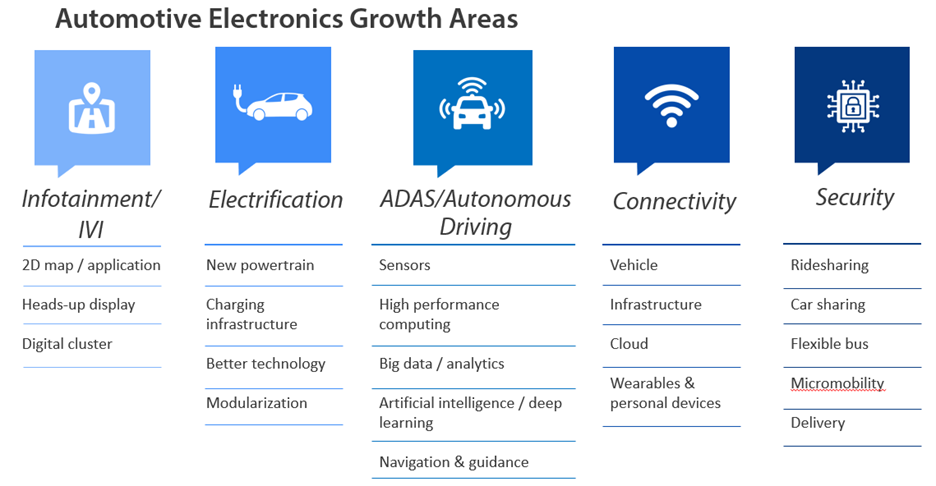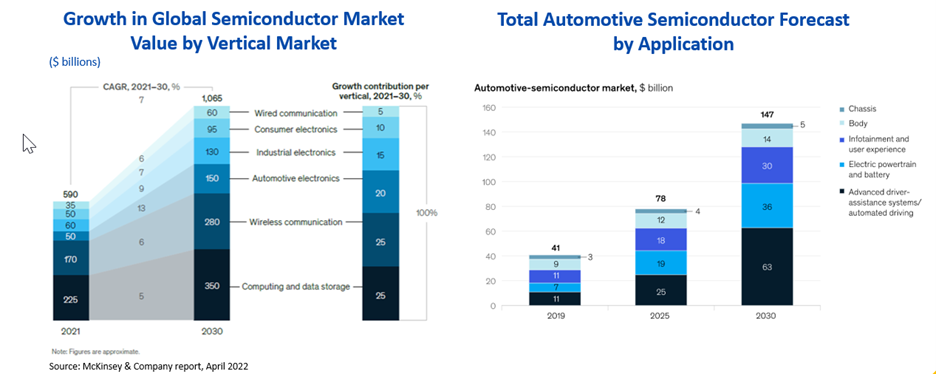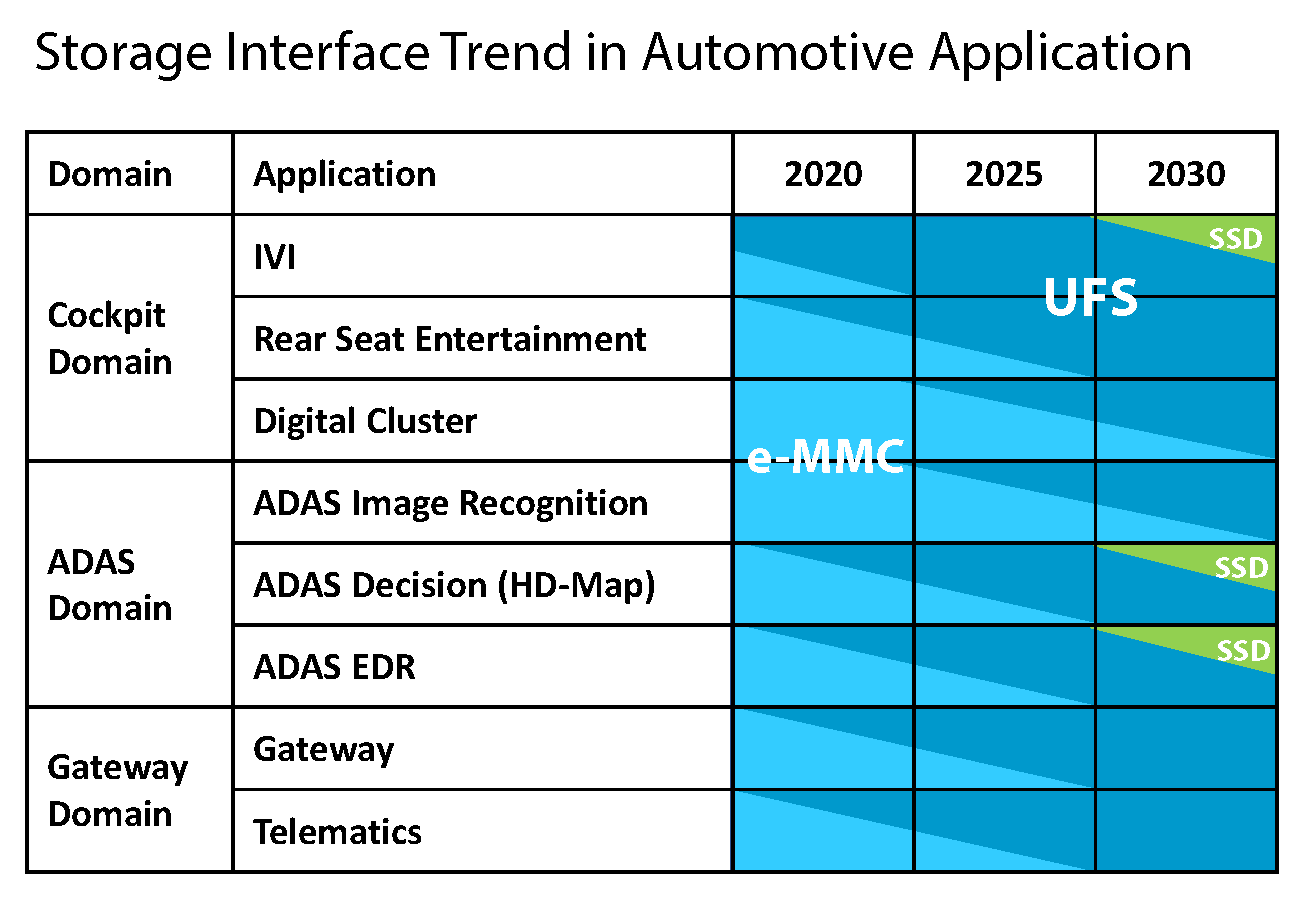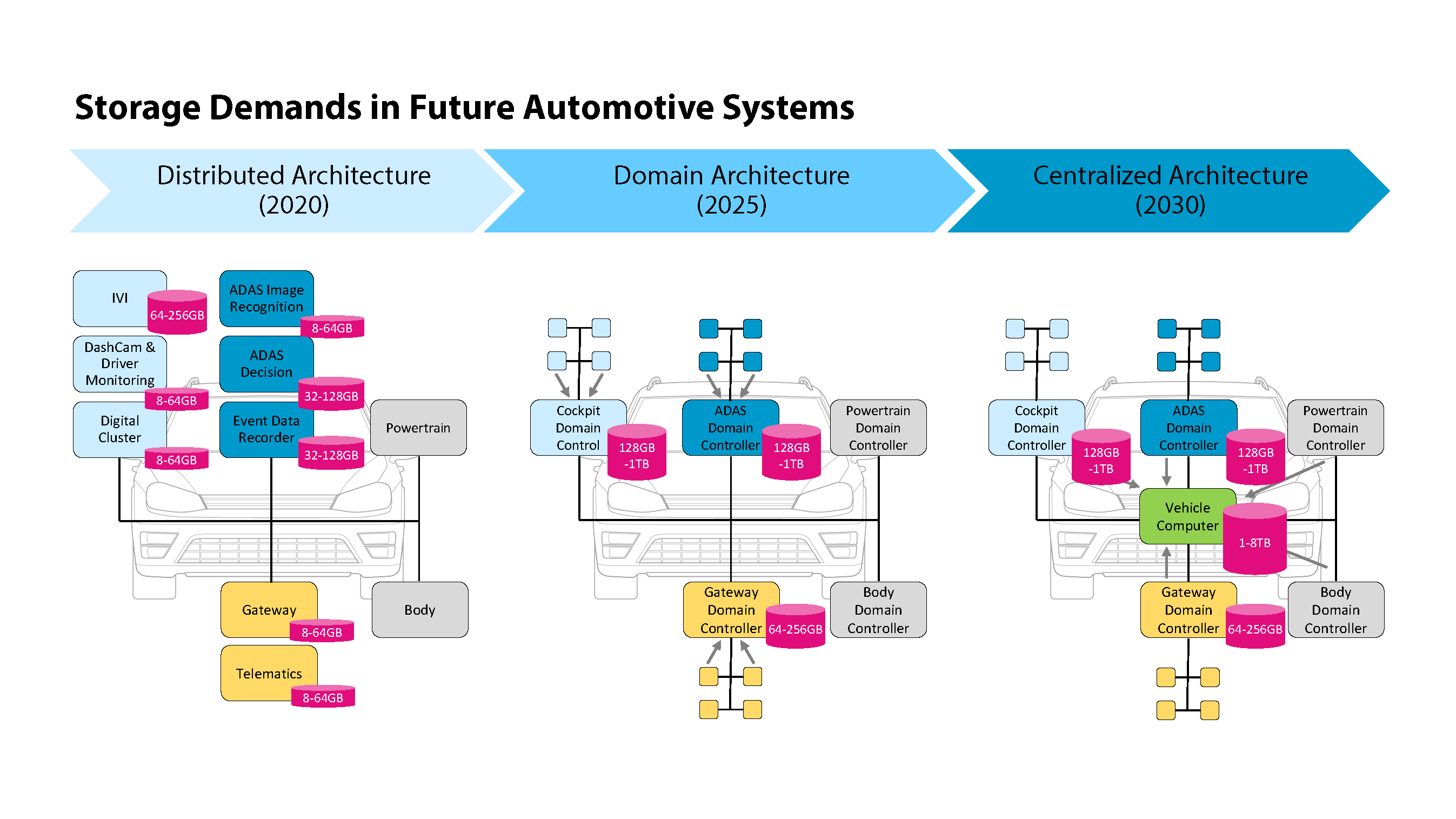Automotive megatrends, particularly those for connected and autonomous vehicles, are shaping the evolution of Flash Memory technologies and defining new programming requirements for automotive electronics manufacturing.

Sources: KPMG, Tektronix
The automotive electronics market is rapidly expanding, driven by five key megatrends: autonomous driving, infotainment, electrification, connectivity, and security. Industry analysts predict a threefold rise in demand for automotive semiconductors within the next eight years. These next-generation automotive applications require more storage for advanced features and event recording. UFS (Universal Flash Storage) has emerged as the preferred memory solution for IVI (In-Vehicle Infotainment) and ADAS (Advanced Driver Assistance Systems) applications. By 2025, over half of these automotive applications will utilize UFS devices, with the majority transitioning from eMMC to UFS by 2030. This shift is driven by a notable increase in programmable content with faster processing speeds for read/write operations, that cater to new requirements for advanced Flash Memory capabilities.


Source: Kioxia
Impact of Automotive Trends on System Architecture and Manufacturing Processes
Connected and autonomous cars are evolving from a hardware-centric to a software-centric design to support new complex features, communication protocols, and security requirements. This is driving changes to the automotive electronics architecture and new flash memory demands. Within the automotive electronics architecture, the shift from a traditional distributed architecture consolidates a multitude of distinct ECUs (Engine Control Units) into a domain-controlled architecture with fewer, more powerful ECUs to support enhanced performance, efficiency, safety, security, and connectivity. The domain architecture consolidates functions like ADAS and infotainment into distinct domains, streamlining resource usage. As vehicles progress towards a more integrated autonomous design, automotive electronics designs will continue transitioning to a centralized or zone-focused approach. This change necessitates advancements in semiconductor technology with higher performance and processing power, increased programmable content, additional storage, and bolstered security.

To meet these demands, automotive electronics are transitioning from eMMC to UFS, which offers faster data access and superior memory capacity. This shift poses challenges for manufacturing, including:
- Maintaining throughput as file sizes grow.
- Ensuring data retention for high-density Flash memory during x-ray and reflow processes.
- Achieving a cost-effective transition from eMMC to UFS.
Strategic planning is essential for manufacturers to smoothly transition their programming process to support UFS and prepare for new requirements that optimize the manufacturing process and address evolving automotive industry needs.
To prepare for the impact of the automotive megatrends and the transition to UFS on your manufacturing and programming process consider these five key questions:
-
Can Your Programming System Support UFS and Large Files?
Ensure your programming technology can be easily upgraded to accommodate future production demands.
-
What is Your Programming System’s Capacity and Can You Scale it?
To combat declining production throughput due to growing file sizes, a programming system with high socket capacity enables manufacturers to expand production throughput without investing in a new programming system.
-
Is your Supplier Innovative and Financially Stable?
A financially stable supplier with a strong history of innovation is essential to reduce the risk of disruption to your manufacturing process when new semiconductor technology is introduced.
-
Can Your Supplier Support New Automotive Security Requirements?
New automotive architectures will drive new security provisioning requirements that will impact manufacturing. A programming system that can be upgraded to support security provisioning for hardware-based security by injecting security credentials into ECUs, DCUs, ZCUs, and CCUs into secure microcontrollers that support automotive cybersecurity standards and models like e-HSM (embedded Hardware Security Modules), SHE (Secure Hardware Extensions) and EVITA (E-safety vehicle intrusion protected applications) during manufacturing is critical.
-
Does Your Supplier Collaborate on Technical Challenges?
Your programming system supplier should have strong industry partnerships and provide co-developed best practices to maximize your quality and throughput.
-
Is Support Easily Accessible?
Manufacturers can’t afford delays in production due to equipment issues. Global service that is available 24/7 and remote support tools are vital to keep production running.
Introducing Data I/O: The Global Standard for Automotive Programming
Data I/O, a trusted supplier and partner to automotive electronics manufacturers, supports the latest automotive programming requirements with the PSV systems and LumenX programming technology. By doubling the programming performance for UFS devices and quadrupling the verification performance with VerifyBoost™, Data I/O streamlines the programming process and offers unmatched efficiency, quality, and cost benefits. In addition, Data I/O’s PSV systems can be upgraded to support security provisioning during the pre-placement programming process with SentriX, simplifying security provisioning at scale for the lowest total cost of ownership.
With the PSV systems, Data I/O provides industry-leading automated programming solutions, combining state-of-the-art robotic handling with LumenX Programming technology for unmatched throughput, programming performance, and socket density for the lowest total cost of ownership. With over 500 installations worldwide and a trusted supplier to 18 out of the top 20 automotive electronics suppliers, customers can upgrade their PSV system to support UFS seamlessly, ensuring flexibility and throughput at a great value. Are you ready to program UFS?
Data I/O’s Automotive Highlights:
-
UFS Programming Expertise: 18 of the top 20 automotive electronics manufacturers use Data I/O systems with over 50 automotive customers programming UFS.
-
Strategic Collaborations: Strong partnerships with leading Flash Memory & UFS suppliers.
-
Performance Excellence: Remarkable results including 10x UFS programming performance improvement.
-
Ongoing Innovation: A 30x performance improvement on LumenX in 8 years.
-
Lowest Total Cost of Programming: VerifyBoost™ for LumenX lowers the total cost of programming for UFS applications by up to 70%.
-
Committed R&D: 25% of sales are dedicated to research and development.
-
Expertise in Security Provisioning: Upgrade a PSV programming system to support hardware-based security during pre-placement programming.
-
Global Support: Over 60 engineers worldwide for consistent production support.
-
Future-Proof Solutions: Ensuring readiness for current and future demands.
At Data I/O, we’re dedicated to providing you with advanced solutions for automotive electronics programming challenges. Contact our knowledgeable team today to explore how Data I/O can help you prepare to program UFS in manufacturing and support new programming requirements for the automotive industry.
Are you ready to learn how you can prepare for new automotive programming requirements? Reach out to our experienced team today to discover how Data I/O's state-of-the-art programming technology can revolutionize your operations.
This blog was updated on September 25, 2023
Discover how automotive megatrends are driving the evolution of Flash Memory technologies and programming solutions in electronics manufacturing. Prepare for the impact and explore Data I/O's advanced programming technology.